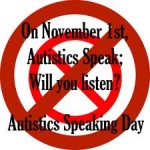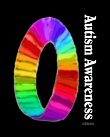Autistics Speaking Day
 There is a battle going on in the Autism Blogosphere. Initially, today was supposed to be a “Communications Shutdown for Autism“. This didn’t set well with me, but I couldn’t really verbalize why at first. Maybe because social networks and online forums are where I learned to know several Autistic adults, and where I first began to find my own voice of advocacy. The online world is where I learned not to live in fear, and that an Autism diagnosis was not the end of the world. It is also, ironically, where I found support and companionship during the years that Autism was the most isolating because going out in public was so stressful and exhausting for everybody in our family. Online is where Autistics have the easiest time communicating, and that I believe to be the crux of why it seemed so wrong.
There is a battle going on in the Autism Blogosphere. Initially, today was supposed to be a “Communications Shutdown for Autism“. This didn’t set well with me, but I couldn’t really verbalize why at first. Maybe because social networks and online forums are where I learned to know several Autistic adults, and where I first began to find my own voice of advocacy. The online world is where I learned not to live in fear, and that an Autism diagnosis was not the end of the world. It is also, ironically, where I found support and companionship during the years that Autism was the most isolating because going out in public was so stressful and exhausting for everybody in our family. Online is where Autistics have the easiest time communicating, and that I believe to be the crux of why it seemed so wrong.
On this day, I wanted to post some links, from Autistic authors.
First, on why I won’t participate on “Communication Shut Down Day” on Facebook and other social Media.
And now, some exerts from Autistic authors:
25 Things I Know as an Autistic Person
by Corina Becker
1. I know that when I step outside my door each day, I enter a world that doesn’t understand me. To me the world is a wondrous, confusing place that I must work hard to navigate. I often wonder how everyone else can stand to handle existence.
2. I know that if people really want to understand Autism, they should be listening to Autistic people. We are the experts of Autistic experience. Ignoring us won’t make us go away.
3. I know that I do not suffer from Autism. I suffer from a lack of understanding and support.
4. I know that being “high functioning” does not mean not being disabled. It means that my disabilities are invisible.
5. I know that having a disability does not mean inability.
6. I know that Autism isn’t what you think. I dare you to think differently.
7. I know that after the whirlwind of childhood, and the emotional minefield of adolescence, I emerged as an adult — still as Autistic as before, and still an adult, with all that entails.
8. I know that what is normal for me is not always normal for you. I know better than to act upon the assumption that “normal” is the same for everyone.
9. I know that if you meet one Autistic person, you’ve met one Autistic person. The experiences, difficulties, strengths, personality and characteristics of one Autistic person does not reflect upon all of them.
10. I know that there’s a difference between not being able to communicate and not having anything to say.
11. I know that the world is an intense place. It screeches and screams, burns, freezes, and bursts into brilliance. It’s a place where words are too small to express the explosion of emotions flowing out of me — a place where words have yet to be invented to express a fraction of the howling fury of frustration and panic, the aching heartbreak, the stabs of betrayal and embarrassment, the abyss of despair and confusion, the weightless ecstasy of joy, the soaring heights of pure wonder, and the warm embrace of security that I feel.
12. I know there are times when people just don’t make sense, but I try my hardest to understand, even if I’m not very successful. I know that even when I can understand, it doesn’t mean that I know what to do.
13. I know that what’s called a lack of social skills for me — and requires me to undergo therapy when I mess up — is considered being rude for everyone else.
14. I know that lashing out isn’t the right way to handle things, but some days it’s the only way to deal with the thunder in myself. Sometimes it’s only my rage that lets me focus on what needs to be done.
15. I know that no amount of time is enough to fully fade the most intense memories; they stay just as sharp, crisp and clear as the day they happened.
16. I know sometimes the only other people who understand are those like me. But just because we’re similar doesn’t mean we’ll always get along.
17. I know that humans aren’t perfect. That doesn’t mean we shouldn’t try our best, but we should realize that we all have our limitations and we need to put things into perspective. A mistake isn’t the end of the world.
18. I know that sometimes you need to let yourself fall apart so you can pick yourself up again and carry on. Nothing lasts forever — the bad or the good.
19. I know that one smile can go a long way.
20. I know that there’s no force in the universe that can make me give up my interests, my “obsessions” and perseverations. These are my strengths, the passions I breathe through my being. I will not let them go without a fight.
21. I know the deep, dark fear of being alone, the stabbing pain of thoughtless words, and the empowering strength of friends.
22. I know you can have an excellent conversation without saying a single word.
23. I know that best friends are those who stay with you through all sorts of pain and struggle, who you would do everything you can to help without being asked.
24. I know that things don’t have to make sense when you’re having fun.
25. I know that diversity leads to the development, invention and creation of new ideas. Differences in thinking should not be shunned but celebrated and embraced. When we all work together to support one another, we can make a huge difference in the world.
A post from my friend. Her voice has always pushed me beyond my comfortable space, and challenged me to think beyond my own perceptions about what Autism looks like from the inside out. I have been changed, for the better, because of her insights. We don’t always agree, but she always makes me think.
Autistics Speaking Day
Posted on November 1, 2010 by adkyriolexy
Being autistic is being set up to fail again and again, and having your inevitable failure attributed to your disordered brain.
Being autistic is being set up to fail again and again, and succeeding anyway and having your success attributed to treatments.
Being autistic is succeeding anyway, and being told that your success doesn’t matter because you still aren’t what your parents wanted.
Being autistic is having strangers pity your parents because of you.
Being autistic is having strangers express their pity in your hearing, because you obviously can’t understand them.
Being autistic is being bullied and abused every day and being sent to therapy for it, because you’re the one whose social skills are considered lacking.
Being autistic is expressing what you think, feel, and desire, and being told that you are in denial.
Being autistic is having other people dictate how you really feel.
Being autistic is being denied the things you enjoy “for your own good.”
Being autistic is being told so many times that your pain is pleasure and your pleasure is pain that you come to believe it.
Being autistic is being driven to extreme frustration every day, and being autistic is having the frustration inflicted on you blamed on your autism.
When I thought about what to write for Autistics Speaking Day, I considered what a cruel bind autistic self-advocates are put in when we discuss our struggles. Frankly acknowledging the hardships we face is interpreted by anti-autistic factions as evidence of the inferiority of our condition, proof that autism is suffering and we would be better off cured. Emphasizing, instead, the benefits, strengths, and exceptional abilities of autism, though, brings charges that we are whitewashing the disadvantages, or that we are so minimally impaired as to be not really autistic. This conveniently absolves pro-cure neurotypicals of the role they and their pathologizing attitudes play in autistic hardship.
My father always told me that I had an exceptional mind. This was why I could read adult books and decipher arithmetic and follow his wandering lectures on various topics at barely four years old. He didn’t mind that I was unable to speak to my peers; it only reduced my vulnerability to being corrupted by them. While he undeniably overestimated my superiority, his unconditional support was a lifesaving counterbalance to the relentless messages to the contrary from teachers, therapists, relatives, peers, and strangers.
A few of my earliest memories involve being introduced at a family gathering and discussed. Why doesn’t she talk? What’s wrong with her? I’m so sorry…. School was worse, with its buzzing lights and pushing crowds and devious people my size hellbent on poking, kicking, grabbing, and beating me into submission. The teachers occasionally intervened, but mostly allowed it in the hopes that I would learn to assert myself. I didn’t.
I was sent to doctors and therapists who claimed that my idiosyncrasies were the result of emotional dysfunction, trauma, or low self-esteem. After prolonged indoctrination, I began to half-accept their premises. I didn’t start out believing that my sensory seeking and social awkwardness was based on a desire to punish myself, but after being told this so many times, I couldn’t help but doubt myself. Their propaganda became self-fulfilling as I began to believe that I was dysfunctional and deserving of punishment. In any other context, this would be called severe emotional abuse, but for neurodivergent children, it is considered necessary treatment.
As I got older and more articulate, the discrimination I faced for being autistic changed forms. Because I appeared intelligent, people could not fathom that I would have difficulty understanding basic things like figures of speech, subtext, visual-spacial perceptions, and pop culture references. I could not, in their minds, have legitimate difficulties, so I must have been rude, or lazy, or intentionally obtuse. The slightest mistake would undo my hard-earned status of hyper-competent and instantly reduce me to my childhood status of “insane.” As I as so intimidated by the prospect of being outed, I learned to nod along and feign understanding. Appearing competent became much more important than being competent, which led to some of the most devastating poor decision-making of my life.
When I became a parent, however, the illusion of normalcy was stripped away. My firstborn inherited my autism, and I had to invent my own way of helping her. Institutional support for parents of autistic children, focused on treatments and cures and the obsessive quest to make children as normal as possible, was repugnant to me, and I refused to let my daughter suffer the way I had. What we lacked was a model for support and learning that was not based on a disorder-treatment model. This is what the neurodiversity movement is trying to build through the personal stories of autistic people, in their own words. Personal stories in which the very real pain and suffering and struggles and obstacles faced by autistic people are not arguments against autism, but arguments against the oppressive model into which autistic people are painfully forced. Autistics are speaking out and will not be silenced. We do not want a cure. We do not want to be made normal. We do not want to prevent future autistic children. We want radical social restructuring such that future autistic children are accepted, nurtured, and supported, and we won’t need silence campaigns for our voices to be heard.
Finally, a link to other voices in the Autism Community

